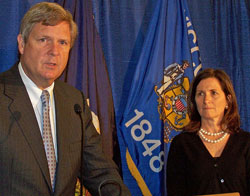 Hundreds of dairy farmers attended a workshop Friday in Madison, Wisconsin on competition in the dairy industry held jointly by the U.S. Departments of Agriculture and Justice.
Hundreds of dairy farmers attended a workshop Friday in Madison, Wisconsin on competition in the dairy industry held jointly by the U.S. Departments of Agriculture and Justice.
“This is the third session of these joint workshops which, from our perspective, have been and should continue to be a major success and an important example of government collaboration,” said Assistant Attorney General Christine Varney, opening the event with Agriculture Secretary Tom Vilsack. “We know that dairy farmers are concerned about a lack of choices for buyers, about the way that their milk is priced, and about a year of dispiriting returns for their labors. It is my hope that today’s conversations will allow us to bring attention and clarity to these issues, and help us to think hard about the role that the Department of Justice and the Department of Agriculture can play in promoting the health and competitiveness of dairy markets in these economic times.”
Panels at the workshop featured representatives from Congress, the Commodity Futures Trading Commission, dairy producing states, industry organizations and farmers themselves. Both of Wisconsin’s U.S. senators attended the event. Senator Russ Feingold says he worked to ensure there was adequate time allotted for the public to participate and raise their concerns directly with administration officials. “These workshops are incredibly important because these officials are getting out of Washington and hearing directly from the family farmers, cheese makers and others whose lives and livelihoods have been impacted by consolidation within the dairy industry,” Feingold said. “I am particularly pleased the administration followed my suggestion to have two public comment sessions.”
The Chicago Mercantile Exchange and its role in price volatility was the target of several complaints at the hearing. Sen. Herb Kohl emphasized the need to make sure dairy pricing is transparent and expressed concerns about potential market manipulation. “The Commodity Futures Trading Commission has reported that the volume of cheese traded in Chicago generally represented less than 1 percent of all cheese produced in the U.S.,” said Kohl. “This is a situation where the tail, controlled by a few traders in Chicago, can wag the dog of the market for milk across the country. At a time when Americans’ trust in financial markets is low, relying on a market that can be easily manipulated should worry all of us. I call on CFTC and the CME to strongly monitor the spot cheese market. We must have market transparency that ensures a fair price for farmers.”
The purpose of the workshop was to gather testimony from dairy industry representatives, which will be taken back to Washington and discussed by the two departments to determine what, if anything, can be done to address producer concerns.
